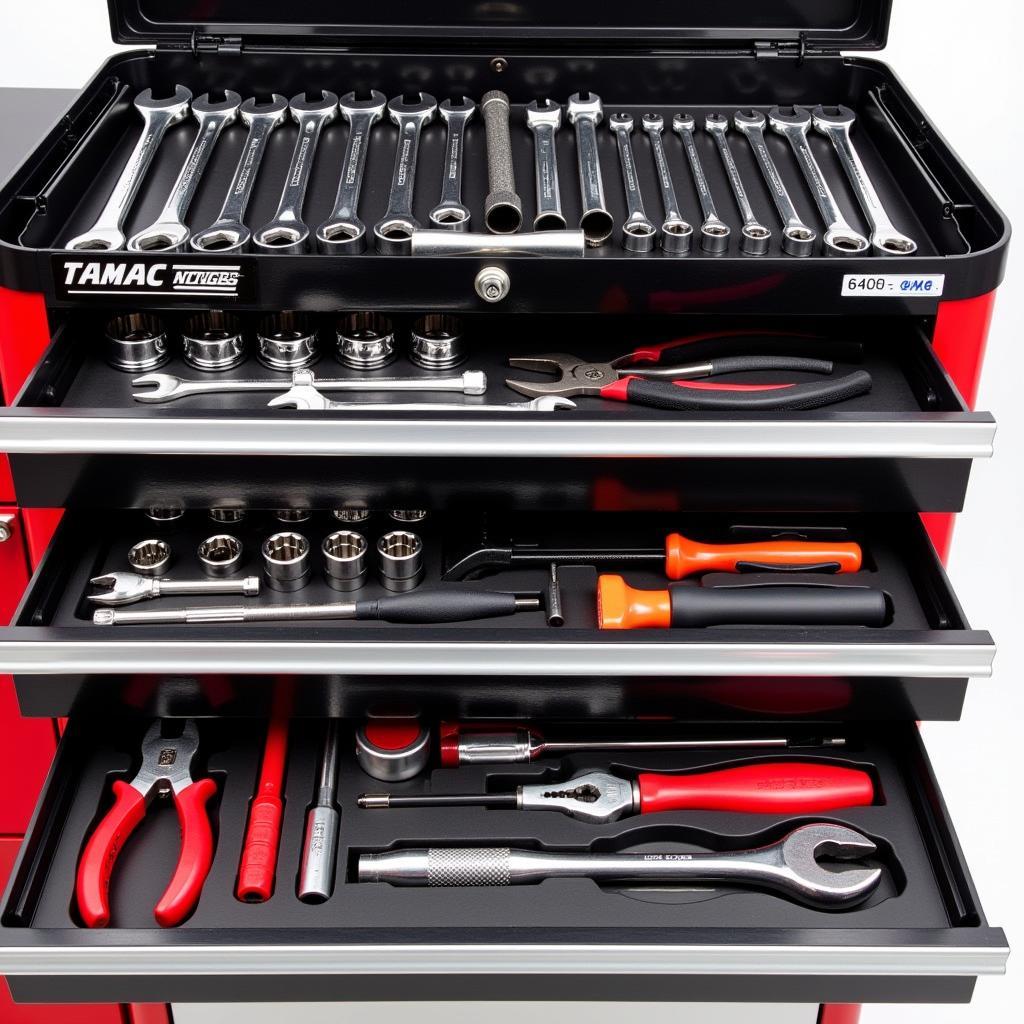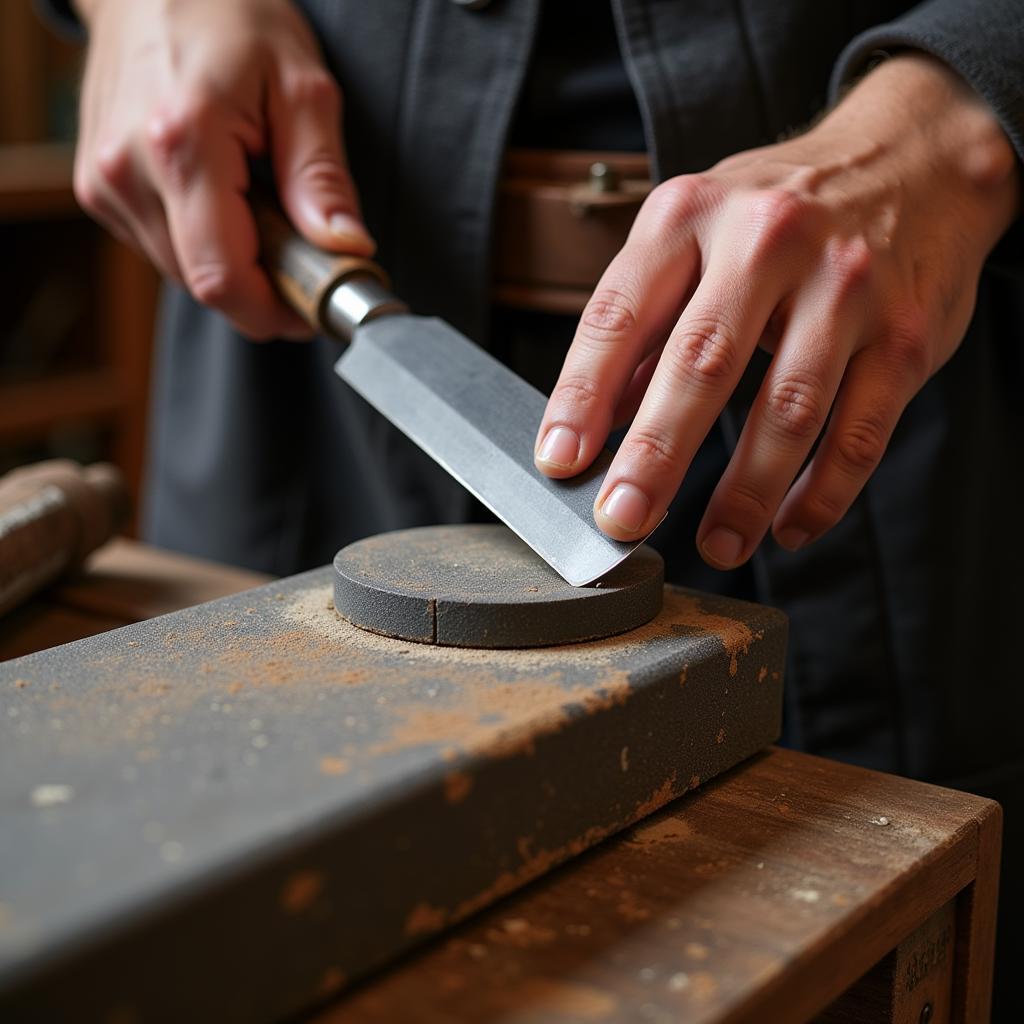Tool Care For Spaces is crucial for any automotive enthusiast or professional. Whether you’re a seasoned mechanic or a weekend DIYer, maintaining your tools ensures they perform reliably and last longer. This translates to better work quality, fewer frustrations, and ultimately, cost savings. car detail tool kit
Why Tool Care Matters in Your Workspace
Proper tool care isn’t just about aesthetics; it’s about functionality and safety. A rusty wrench can slip, leading to injury, while a dull blade can damage materials. Clean, organized tools also contribute to a more efficient workspace. Knowing where each tool is saves valuable time and minimizes the risk of misplacing or damaging them.
Organizing Your Tools for Optimal Space
Organizing your tools is the first step in proper tool care for spaces. Consider using tool chests, pegboards, or labeled drawers. This not only keeps your tools protected but also makes it easier to find what you need.  Organized Tool Chest with Labeled Drawers
Organized Tool Chest with Labeled Drawers
Cleaning and Protecting Your Automotive Tools
Cleaning your tools regularly prevents corrosion and ensures they function correctly. Use a wire brush to remove dirt and rust, and then apply a light coat of oil to protect metal surfaces. For power tools, follow the manufacturer’s instructions for cleaning and maintenance. What tools should you use for specific cleaning tasks? For detailed cleaning, you might find our guide on car detailing interior tools helpful.
Protecting Tools from Moisture and Corrosion
Moisture is the enemy of tools. Store them in a dry, climate-controlled environment whenever possible. Silica gel packets can help absorb moisture in enclosed toolboxes. Tool care for spaces also involves choosing the right materials for your storage solutions; opt for rust-resistant materials like stainless steel or plastic whenever possible.
Specific Tool Care Tips
Different tools require different care. For example, cutting tools like saws and blades should be sharpened regularly to maintain their effectiveness. Precision tools like calipers and micrometers require careful handling and storage to prevent damage.  Sharpening Chisels and Blades with a Whestone
Sharpening Chisels and Blades with a Whestone
Caring for Power Tools
Power tools require special attention. Always disconnect the power source before cleaning or performing any maintenance. Regularly lubricate moving parts and inspect cords for damage. Knowing which tools are appropriate for specific tasks is crucial, particularly when working with metal. Our guide on the best tool to cut sheet metal off car can offer valuable insights.
Tool Care for Spaces: Long-Term Strategies
Investing in high-quality tools is a good start, but proper maintenance is essential for maximizing their lifespan. Regularly inspect your tools for wear and tear, and replace any damaged parts promptly. Consider creating a maintenance schedule to ensure that tool care becomes a routine part of your workflow.
“Regular tool maintenance is like an oil change for your car,” says John Davis, a seasoned automotive technician with over 20 years of experience. “It’s preventative care that saves you money and headaches down the road.”
Building a Tool Kit for Your Needs
Choosing the right tools for your needs is also part of tool care. A well-curated toolkit allows you to work efficiently and effectively. For hobbyists, model car building tool kits provide a great starting point.
“Building a comprehensive tool kit doesn’t happen overnight,” adds Sarah Miller, an automotive engineer and DIY enthusiast. “Start with the essentials and gradually add specialized tools as your projects demand.”
Conclusion
Effective tool care for spaces is a fundamental aspect of any automotive workshop, whether professional or personal. By implementing these tips, you’ll not only extend the life of your tools but also enhance your work quality and create a safer, more organized environment. Remember, investing time in tool care today saves you time and money in the long run.
FAQ
- How often should I clean my tools?
- What type of oil should I use for tool protection?
- How do I store power tools safely?
- What are the signs of a damaged tool?
- Where can I find replacement parts for my tools?
- What are some essential tools for a beginner mechanic?
- How can I organize a small workspace for tool storage?
Common Tool Care Scenarios
- Rusty Tools: Soak them in a rust remover solution, then scrub with a wire brush.
- Dull Blades: Sharpen them using a honing steel or whetstone.
- Sticky Moving Parts: Apply lubricating oil.
Further Resources
Looking for more information on car maintenance? Check out our article on what is the tool used to recharge ac in car.
Need help with your car diagnostics? Contact us via WhatsApp: +1(641)206-8880, Email: [email protected] or visit us at 910 Cedar Lane, Chicago, IL 60605, USA. Our customer service team is available 24/7.

Leave a Reply